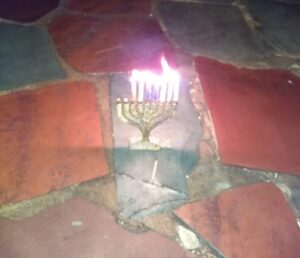 Our shul has recently embarked upon a course of community-building around anti-racism and diversity. We have employed trained facilitators to guide our conversation. From my perspective as a queer Jew, I offered up a comment in our first session about how the way in which I interact with the shul gives me some insight into how systemic racism may operate in our congregation, not necessarily overtly, but as an institutional problem.
Our shul has recently embarked upon a course of community-building around anti-racism and diversity. We have employed trained facilitators to guide our conversation. From my perspective as a queer Jew, I offered up a comment in our first session about how the way in which I interact with the shul gives me some insight into how systemic racism may operate in our congregation, not necessarily overtly, but as an institutional problem.
A member asked me how I could say that there was a lack of acceptance for me as a queer Jew, when the Rabbi readily agreed to my request for the use of gender neutral pronouns when calling an individual up to read from the Torah. This terrific question calls for a measured answer.
The Rabbi agreeing to gender neutral pronouns is a validating and good feeling thing, an individual act of kindness and recognition. As an individual, people treat me with respect and acceptance. Yet it’s the institutional things that are difficult.
In our services we make an effort to mic all speakers, which is radical for a Conservative oriented shul, and very helpful to me as a person whose hearing is somewhat limited. We strive to accommodate with ramp and large print prayer books. There are a good number of caring folks heading up and participating in our committees and Board. And yet, it is an institution with a history, with habits of thought, with practices, with policies that may not speak fully to some of the marginalized constituents, be they queer Jews, Jews of color, patrilineal Jews, disabled Jews, Jews by choice, interfaith partners.
Speaking for myself personally, during an in-person prayer service, I can tune out the masculinist prayer book, Siddur Sim Shalom, the old Conservative siddur from 1985, because I carry with me one or two of my personal prayer books: Siddur Lev Shalem is the new Conservative siddur that has gone a long way to providing gender inclusive and matriarch inclusive language. Siddur Shahar Za’av is a siddur published by a queer synagogue. I can and do make individual accommodations for myself by tuning out what the congregation is reciting, while listening to and participating in the music.
Yet, the masculinist prayer book on Sat mornings is the unquestioned and unapologized nexus of Saturday prayer, it is part of the institution of the shul. It annoys me. It sets my teeth on edge in places. As a representation of the institution where I am a member, it excludes me and my lived experience. It shows me that no matter how welcoming some individuals are, as an institution we have work to do to celebrate and include LGBTQ Jews.
What holds me in the community is the promise of greater inclusion and celebration. In our weekly Shabbat Torah study sessions, I often bring in the teaching of queer and/or disabled Jews. When given a chance to read from the Torah, I have been able to bring in a feminist and/or queer and/or disabled perspective to the Torah portion. Reactions from congregants and the Rabbi are positive and heartwarming.
From this experience, I can now question: in what way is our shul, as an institution, perpetuating racism, in the same way that the siddur perpetuates an institutional masculinist/patriarchal view of the divine? In what way are we as an institution expecting marginalized persons to do all the heavy lifting? We have individuals who are queer, of color, disabled, in interfaith families, and we often are able to provide welcome and accommodation. But the culture overall is white, Ashkenazi, and heteronormative. Having one or two or even three members from any group does not make a culture.
I am proud to say that our shul is grappling with these questions of inclusion and celebration, of understanding systemic racism and biases. We can only move forward by truth telling, by asking ourselves and each other hard questions, and by sitting with some discomfort in the process.
 Ruach HaYam teaching presented by Penina Weinber
Picture is a photo of a small hannukiah lit in the midst of a great cold wind on the cobblestone front porch of an empty house on a Maine beach on the 6th day of Hanukkah in 2019.
No, we’re not at Hanukkah yet, but we are at the Jewish calendar date 3 Kislev, the beginning of the month in which Hanukkah falls, and the darkest month of the year. We are two days after the new moon of Kislev. We can take hope in candles lit against the darkness. We are also at Parashat Toldot, Genesis 25:19-28:9, wherein Rebecca makes the most existential cry of the entire Torah, and Jacob and Esau fight against the gender roles assigned them at birth, reversing them with the support of the Divine and Rebecca. And we’re at Transgender Day of Remembrance. As Jill Hammer writes below, we are in a time of introspection and outward action. We’ll talk about the texts, about Judith and Rebecca, about gender roles, and about how to bring light into darkness.
Jill Hammer’s book The Jewish Book of Days: A Companion for All Seasons situates each day of the year in its season, quarter, phase, and part of nature. Jill writes this about Kislev, in ancient Israel:
“Once the new moon was announced, bonfires were lit in the hills above Jerusalem. Far-flung communities would see the bonfires and light their own, until all the Jewish communities knew that the new moon had come. As stars help a ship locate itself on the sea, the bonfires helped Jews locate themselves in time, joining them to the root consciousness of their people.
According to Rabbi Judah, the 1st of Kislev is the first day of winter in Israel (Babylonian Talmud, Bava Metzi’a 106b). We are close now to the darkest days of the year, and the new moon bonfires remind us of the Hanukkah candles growing each night. The flames teach that when the moon is dark, we can expect its face to shine again, and when the sunlight is dimming, soon it will begin to grow again. This is true also for us: The quiet of introspection can and should lead to outward action in the world.”
Penina Weinberg is an independent Hebrew bible scholar whose study and teaching focus on the intersection of power, politics and gender in the Hebrew Bible. She has run workshops for Nehirim and Keshet and has been teaching Hebrew bible for 10 years. She has written in Tikkun and HBI blog, and is the leader and founder of Ruach HaYam.
*** Ruach HaYam https://www.facebook.com/groups/Ruach.HaYam/ study sessions provide a queer Jewish look at text, and are welcoming to LGBTQ+ and allies, to any learning or faith background, to all bodies, and friendly to beginners***
Ruach HaYam teaching presented by Penina Weinber
Picture is a photo of a small hannukiah lit in the midst of a great cold wind on the cobblestone front porch of an empty house on a Maine beach on the 6th day of Hanukkah in 2019.
No, we’re not at Hanukkah yet, but we are at the Jewish calendar date 3 Kislev, the beginning of the month in which Hanukkah falls, and the darkest month of the year. We are two days after the new moon of Kislev. We can take hope in candles lit against the darkness. We are also at Parashat Toldot, Genesis 25:19-28:9, wherein Rebecca makes the most existential cry of the entire Torah, and Jacob and Esau fight against the gender roles assigned them at birth, reversing them with the support of the Divine and Rebecca. And we’re at Transgender Day of Remembrance. As Jill Hammer writes below, we are in a time of introspection and outward action. We’ll talk about the texts, about Judith and Rebecca, about gender roles, and about how to bring light into darkness.
Jill Hammer’s book The Jewish Book of Days: A Companion for All Seasons situates each day of the year in its season, quarter, phase, and part of nature. Jill writes this about Kislev, in ancient Israel:
“Once the new moon was announced, bonfires were lit in the hills above Jerusalem. Far-flung communities would see the bonfires and light their own, until all the Jewish communities knew that the new moon had come. As stars help a ship locate itself on the sea, the bonfires helped Jews locate themselves in time, joining them to the root consciousness of their people.
According to Rabbi Judah, the 1st of Kislev is the first day of winter in Israel (Babylonian Talmud, Bava Metzi’a 106b). We are close now to the darkest days of the year, and the new moon bonfires remind us of the Hanukkah candles growing each night. The flames teach that when the moon is dark, we can expect its face to shine again, and when the sunlight is dimming, soon it will begin to grow again. This is true also for us: The quiet of introspection can and should lead to outward action in the world.”
Penina Weinberg is an independent Hebrew bible scholar whose study and teaching focus on the intersection of power, politics and gender in the Hebrew Bible. She has run workshops for Nehirim and Keshet and has been teaching Hebrew bible for 10 years. She has written in Tikkun and HBI blog, and is the leader and founder of Ruach HaYam.
*** Ruach HaYam https://www.facebook.com/groups/Ruach.HaYam/ study sessions provide a queer Jewish look at text, and are welcoming to LGBTQ+ and allies, to any learning or faith background, to all bodies, and friendly to beginners***
 Ruach HaYam teaching presented by Penina Weinber
Picture is a photo of a small hannukiah lit in the midst of a great cold wind on the cobblestone front porch of an empty house on a Maine beach on the 6th day of Hanukkah in 2019.
No, we’re not at Hanukkah yet, but we are at the Jewish calendar date 3 Kislev, the beginning of the month in which Hanukkah falls, and the darkest month of the year. We are two days after the new moon of Kislev. We can take hope in candles lit against the darkness. We are also at Parashat Toldot, Genesis 25:19-28:9, wherein Rebecca makes the most existential cry of the entire Torah, and Jacob and Esau fight against the gender roles assigned them at birth, reversing them with the support of the Divine and Rebecca. And we’re at Transgender Day of Remembrance. As Jill Hammer writes below, we are in a time of introspection and outward action. We’ll talk about the texts, about Judith and Rebecca, about gender roles, and about how to bring light into darkness.
Jill Hammer’s book The Jewish Book of Days: A Companion for All Seasons situates each day of the year in its season, quarter, phase, and part of nature. Jill writes this about Kislev, in ancient Israel:
“Once the new moon was announced, bonfires were lit in the hills above Jerusalem. Far-flung communities would see the bonfires and light their own, until all the Jewish communities knew that the new moon had come. As stars help a ship locate itself on the sea, the bonfires helped Jews locate themselves in time, joining them to the root consciousness of their people.
According to Rabbi Judah, the 1st of Kislev is the first day of winter in Israel (Babylonian Talmud, Bava Metzi’a 106b). We are close now to the darkest days of the year, and the new moon bonfires remind us of the Hanukkah candles growing each night. The flames teach that when the moon is dark, we can expect its face to shine again, and when the sunlight is dimming, soon it will begin to grow again. This is true also for us: The quiet of introspection can and should lead to outward action in the world.”
Penina Weinberg is an independent Hebrew bible scholar whose study and teaching focus on the intersection of power, politics and gender in the Hebrew Bible. She has run workshops for Nehirim and Keshet and has been teaching Hebrew bible for 10 years. She has written in Tikkun and HBI blog, and is the leader and founder of Ruach HaYam.
*** Ruach HaYam https://www.facebook.com/groups/Ruach.HaYam/ study sessions provide a queer Jewish look at text, and are welcoming to LGBTQ+ and allies, to any learning or faith background, to all bodies, and friendly to beginners***
Ruach HaYam teaching presented by Penina Weinber
Picture is a photo of a small hannukiah lit in the midst of a great cold wind on the cobblestone front porch of an empty house on a Maine beach on the 6th day of Hanukkah in 2019.
No, we’re not at Hanukkah yet, but we are at the Jewish calendar date 3 Kislev, the beginning of the month in which Hanukkah falls, and the darkest month of the year. We are two days after the new moon of Kislev. We can take hope in candles lit against the darkness. We are also at Parashat Toldot, Genesis 25:19-28:9, wherein Rebecca makes the most existential cry of the entire Torah, and Jacob and Esau fight against the gender roles assigned them at birth, reversing them with the support of the Divine and Rebecca. And we’re at Transgender Day of Remembrance. As Jill Hammer writes below, we are in a time of introspection and outward action. We’ll talk about the texts, about Judith and Rebecca, about gender roles, and about how to bring light into darkness.
Jill Hammer’s book The Jewish Book of Days: A Companion for All Seasons situates each day of the year in its season, quarter, phase, and part of nature. Jill writes this about Kislev, in ancient Israel:
“Once the new moon was announced, bonfires were lit in the hills above Jerusalem. Far-flung communities would see the bonfires and light their own, until all the Jewish communities knew that the new moon had come. As stars help a ship locate itself on the sea, the bonfires helped Jews locate themselves in time, joining them to the root consciousness of their people.
According to Rabbi Judah, the 1st of Kislev is the first day of winter in Israel (Babylonian Talmud, Bava Metzi’a 106b). We are close now to the darkest days of the year, and the new moon bonfires remind us of the Hanukkah candles growing each night. The flames teach that when the moon is dark, we can expect its face to shine again, and when the sunlight is dimming, soon it will begin to grow again. This is true also for us: The quiet of introspection can and should lead to outward action in the world.”
Penina Weinberg is an independent Hebrew bible scholar whose study and teaching focus on the intersection of power, politics and gender in the Hebrew Bible. She has run workshops for Nehirim and Keshet and has been teaching Hebrew bible for 10 years. She has written in Tikkun and HBI blog, and is the leader and founder of Ruach HaYam.
*** Ruach HaYam https://www.facebook.com/groups/Ruach.HaYam/ study sessions provide a queer Jewish look at text, and are welcoming to LGBTQ+ and allies, to any learning or faith background, to all bodies, and friendly to beginners***


